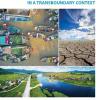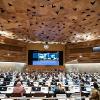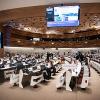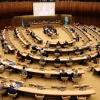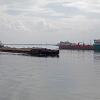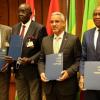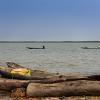Environment Press Releases
Displaying Results 76 - 100 of 339
While agriculture and food production cause significant air pollution, air pollution can also have significant impacts on crops, other vegetation and entire ecosystems. This, in turn, can impact on agricultural yields and food production and can lead to significant economic losses.
To review new
Uganda has 98 per cent of its water resources within the Nile River Basin. The Nile River is the longest transboundary river in Africa. Cooperation on the Nile Basin water resources, according to Uganda’s Minister for Water and Environment, His Excellency, Hon. Sam Cheptoris, is therefore “not a
Heavy metals such as mercury have led to great harm to human health and the environment, for example in the 1950s in Minamata, Japan, when the release of methylmercury in the industrial wastewater from a chemical factory poisoned many people. Even in smaller quantities, heavy metals released into
Developed in the first half of the 20th century, persistent organic pollutants (POPs) have been regulated or banned as widespread public concern over their toxicological effects for human health and the environment has increased. Research has shown that exposure to POPs can lead to serious health
“The explosion came at a very high cost with over 218 deaths, 6,000 injured, and at least 15 billion USD in destruction to infrastructure. In around 15 minutes Beirut lost over 15 years of development gains. We must learn lessons from this catastrophic disaster, not just for Lebanon but for the
Which users may use how much water of a river, lake, aquifer or other source? For what purposes, where and when?
These are the questions which a new Handbook on transboundary ‘water allocation’–which is the process and/or outcome of determining how different stakeholders use water–published under
Almost 2 years into the pandemic, we have all experienced long and repeated lockdowns. Recent news from New Delhi, however, tell us that the city has gone into another lockdown – this time because of heavy air pollution.
Winter is also the season when air pollution problems in the UNECE region
Today, the Inaugural Meeting of the Working Group on Tailings Safety and the Prevention of Accidental Water Pollution (IIWG) took place in Tajikistan, bringing together representatives of different national authorities, operators, international institutions and interested specialists to strengthen
The Beirut port explosion in August 2020, caused by fire spreading across a storage area detonating a large amount of ammonium nitrate (AN), resulted in 300 deaths and 6,500 injuries, the displacement of about 300,000 people and severe damage to the port and city, including healthcare facilities
Increasingly frequent and intense extreme weather events due to climate change that can lead to industrial accidents and unchecked urban and regional development could together be a recipe for disaster, warn the UN and the governments of Albania, Bosnia and Herzegovina, Montenegro, North Macedonia
Today, Serbia became the first country in the pan-European region to launch a National Policy Dialogue (NPD) on Industrial Safety, supported by UNECE in the framework of the Convention on the Transboundary Effects of Industrial Accidents (Industrial Accidents Convention). Since its accession to the
A decision establishing a rapid response mechanism for the protection of environmental defenders was adopted by the Meeting of the Parties to the Convention on Access to Information, Public Participation in Decision-Making and Access to Justice in Environmental Matters (Aarhus Convention) at its
This week nearly 450 participants from close to 50 countries attended the seventh and fourth sessions of the Meetings of the Parties to the Aarhus Convention (Convention on Access to Information, Public Participation in Decision-making and Access to Justice in Environmental Matters) and to its
Global estimates for financing needs for water-related investments to achieve Sustainable Development Goal 6 on water range from $6 .7 trillion by 2030 to $22.6 trillion by 2050, according to the OECD. Investments are needed not only to build new infrastructure but also to maintain and operate
Can the oft-shared, yet increasingly scarce and most precious, resource that is water be a source of cooperation, rather than of conflict, among countries? If so, then how? As climate change brings prolonged droughts and more intense floods, how will Governments cope together? More than 20
Togo is the fifth country outside the pan-European region to accede to the Convention on the Protection and Use of Transboundary Watercourses and International Lakes (Water Convention), for which UNECE ensures the Secretariat. This comes as more and more countries – especially in Africa –are
Ministers from The Gambia, Guinea Bissau, Mauritania and Senegal have agreed to establish a legal and institutional framework for cooperation on the Senegal-Mauritanian Aquifer Basin (SMAB), a shared aquifer basin (groundwater reserve) on which 80% of their populations depend. In a context of
Joining the Convention on the Protection and Use of Transboundary Watercourses and International Lakes (Water Convention) makes a difference! Parties to the Water Convention constantly advance water cooperation at the basin, subbasin and bilateral levels. The conclusion of at least 10 new
Results of the second Sustainable Development Goal (SDG) report on transboundary water cooperation, published today by UNECE and UNESCO (co-custodian agencies for SDG indicator 6.5.2) on behalf of UN-Water, suggests that not nearly enough operational arrangements for transboundary water cooperation
On 27 July 2021 around 9:40 am, a major explosion at the 480 hectare Chempark in Leverkusen, Germany, shocked the local population within a radius of 40km who heard and felt the detonation – and even beyond that, as the toxic plume was still visible in Dortmund, nearly 80 km away. The explosion
The United Nations Economic Commission for Europe (UNECE) and the European Investment Bank, the financial investment arm of the European Union, have signed today a Memorandum of Understanding (MoU) to strengthen joint efforts to promote economic cooperation, cohesion and to support countries in the
On 16 June, Guinea-Bissau became the 4th African country (45th party) to accede to the Convention on the Protection and Use of Transboundary Watercourses and International Lakes (Water Convention), whose secretariat is provided by UNECE. It is also a party to the Convention on the Law of the Non-
Despite decades of discussions on the challenges and intersections between gender and transport, progress has been slow in implementing a gender perspective in transport policies. This has been problematic, for example, in urban planning which fails to recognise the different travel patterns
The COVID-19 pandemic spread around the world at lightning speed, devastating cities and communities and prompting a lockdown. The lockdown period also provided some respite for nature, resulting in memorable sights of ‘nature unlocked’ in our urban habitats.
To immortalize such sights and to
Human-caused methane emissions are rising, and must be reduced by 40 to 45 per cent by 2030 to limit global temperature rise to 1.5° C, warned the Global Methane Assessment released last month by the Climate and Clean Air Coalition (CCAC) and the United Nations Environment Programme (UNEP). This







